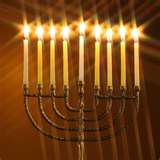Passing the Torch
by Rabbi Mordechai Rhine
Among the mitzvos in this week’s parsha is the mitzvah to light the menorah. “Command the Jewish people and they should take oil …” What is  striking is that we already encountered this very mitzvah previously in Parshas Titzaveh. Why does the Torah repeat this mitzvah?
striking is that we already encountered this very mitzvah previously in Parshas Titzaveh. Why does the Torah repeat this mitzvah?
The commentaries offer a fascinating answer based on a verse in Parshas Vayakheil which says, “The princes brought the oil to light the menorah.” The original oil to light the menorah was brought by the princes, the elite and most dedicated of the people. But, in the words of the Ramban, “Now that oil had run out.” A few Torah portions later the oil needed to be replenished. This time the princes did not take the mitzvah for themselves. This time the mitzvah was assigned to the Jewish people as a communal responsibility.
These two perspectives- that of the dedicated few and that of communal responsibility- play themselves out in our daily lives. It is important not to confuse them.
There are times when individuals have to stand alone with dedication to a cause that they hold dear. In such times we take guidance from the princes who fueled the menorah initially on their own. In a similar way, we gain inspiration from our father Avraham who was called “Ivri,” the man on the other side. The rest of the world believed in idols and Avraham stood alone in his belief in One G-d.
When Avraham was about to be thrown into a fiery furnace because of his beliefs, the angels vied before G-d for the opportunity to save Avraham. G-d rejected their requests and said, “I am alone in My world, and he is alone in his world. It is fitting for the One Who stands alone to save the one who stands alone.”
Such is the great legacy of standing alone, when necessary.
But there are other times when we are expected to unite. To stand alone is inappropriate.
I recall with fondness one of the family trips that we took to the zoo. It was the middle days of Pesach, so there were many other Jewish families vacationing there as well. As the day progressed people mentioned to one another that we should meet at the main entrance at 5:00 for the afternoon prayers. Sure enough, as 5:00 approached I estimated a crowd of close to 150 people who had come to daven mincha. But what was interesting was that everyone was waiting. As the minutes ticked by, and no Cantor had been chosen to lead the services, some people became impatient and began to pray privately, on their own. Others followed their lead; they too began praying on their own. I looked around and I thought, “One hundred and fifty people…But they are praying separately, as individuals.” It wasn’t until, in typical Jewish fashion, someone clapped, and called out the first words of the afternoon service, that the individuals united in their common goal.
This Sunday, our shul, Southeast Hebrew Congregation- Knesset Yehoshua in Silver Spring will Iy’h have the privilege to combine these two great perspectives in a Hachnosas Sefer Torah (the dedication of a new Torah scroll), in memory of our dear friend Fred Mailman. Fred was a person who was willing to stand alone as a leader when necessary, for the sake of the shul, the Jewish community, and Jewish education. He served as President and on the Board for numerous years, and inspired so many with his high standards of dedication to Torah and to interpersonal relationships. But with his passing, it becomes incumbent on us, those who recall his legacy, to strive collectively to be inspired by his lesson. By collectively sponsoring this Sefer Torah in his memory we hope to be like the Jewish people at the time of the Mishkan, accepting that, moving forward, the responsibility to keep the lights of Torah burning brightly is upon all of us. Collectively we ensure that the menorah, representing the light of Torah, will burn brightly.
May his memory be a blessing.
© 2017 by TEACH613™


0 Comments